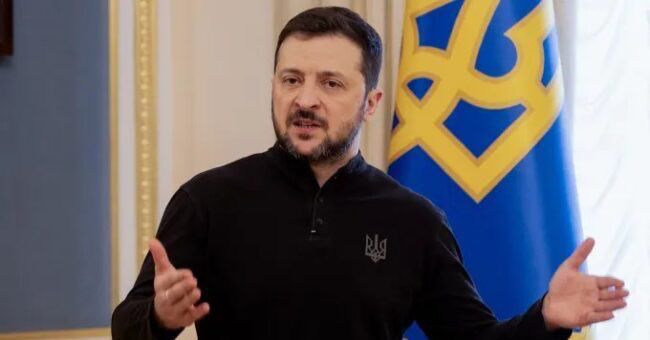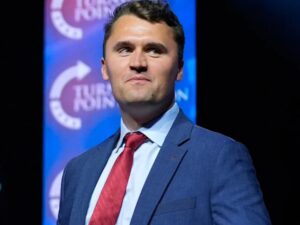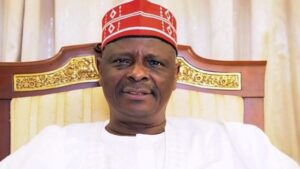
Ukrainian President Volodymyr Zelenskyy has expressed his willingness to relinquish his position if it would secure peace for Ukraine, suggesting this could be in exchange for the country’s accession to NATO.
Speaking on the eve of the third anniversary of Russia’s large-scale invasion, he acknowledged growing pressure from Washington to engage in peace negotiations.
“If there is peace for Ukraine, if you really need me to leave my post, I am ready… I can exchange it for NATO,” Zelenskyy declared at a press conference in Kyiv, emphasizing that he would step down “immediately” if required.
Following a tense week marked by a public dispute with US President Donald Trump, Zelenskyy extended an invitation for Trump to visit Ukraine and expressed appreciation for American assistance throughout the war. “I want very much mutual understanding with Trump,” he stated, adding, “Security guarantees from Trump are much needed.”
However, Zelenskyy questioned Trump’s claim that the US had provided $500 billion in support, asserting that the actual figure was closer to $100 billion. He also made it clear that he did not view past US grants as loans.
Transatlantic Divisions
His remarks come at a time of increasing concern over fractures in the transatlantic alliance, as Washington has engaged in high-level direct talks with Moscow.
Over the past week, President Trump criticized Zelenskyy and suggested he bore some responsibility for the war. He later moderated his statement during an interview on Fox News Radio, saying Zelenskyy should not have “allowed Russia to attack.”
Zelenskyy, in turn, had provoked frustration in Washington by remarking that Trump lived in “a disinformation bubble.”
Trump has also suggested that Zelenskyy may not be essential to peace negotiations and proposed that Ukraine’s mineral wealth could be used as compensation for US financial support. According to Trump aide Steve Witkoff, a peace agreement could be finalized this week. Zelenskyy insisted that any such deal must include security assurances for Ukraine and stated that deployment of US troops in the country would be a logical step.
European Diplomacy
European leaders have echoed Zelenskyy’s concerns about Western disunity and the risk of being sidelined in discussions on ending the war.
While other Western officials travel to Kyiv on February 24, French President Emmanuel Macron will head in the opposite direction for talks with Trump in Washington. British Prime Minister Keir Starmer is expected to follow later in the week, seeking common ground with Trump on the path forward.
“Nobody wants the bloodshed to continue. Nobody, least of all the Ukrainians,” Starmer stated at a party conference in Glasgow on February 23.
“But after everything that they have suffered, after everything that they have fought for, there could be no discussion about Ukraine without Ukraine, and the people of Ukraine must have a long-term secure future.”
Starmer reaffirmed Britain’s readiness to commit troops to Ukraine as part of a peace agreement. European leaders have held urgent discussions on the matter in response to concerns that Washington may be reconsidering further support.
In a further show of solidarity with Kyiv, British Foreign Secretary Daniel Lammy announced on February 23 that the UK would impose its most extensive package of sanctions on Russia to mark the war’s third anniversary.
Russia’s Perspective
Meanwhile, Russian President Vladimir Putin delivered a speech on February 23, using religious rhetoric to justify his nation’s invasion of Ukraine.
“Fate willed it so, God willed it so,” he proclaimed during an event in Moscow attended by soldiers who had fought in Ukraine.
This is not the first time Putin has invoked such language to rationalise Russia’s aggression. In 2014, he defended the annexation of Crimea by claiming the peninsula held a “sacred meaning” for Russia, likening it to the Temple Mount in Jerusalem.
At the same time, Ukraine endured its most extensive drone assault from Russia overnight between February 22 and 23, with reports of casualties emerging from multiple regions. The attacks underscored Ukraine’s vulnerability and its reliance on American military aid.
Speaking to Current Time, military analysts highlighted that while European assistance could replace US support in some areas, air defense remains a domain where Kyiv depends heavily on Washington.
“All other [military supplies] can be found in Europe. In some way, European help can replace American help. But air defense—this is the key area,” explained Oleksiy Alshanskiy from the Conflict Intelligence Team.




![[PHOTOS] Arewa Offa, Mustapha Amidat Concludes Skill Acquisition, Exhibition Programme](https://newsbulletin.com.ng/wp-content/uploads/2025/09/IMG-20250920-WA0011-300x300.jpg)




